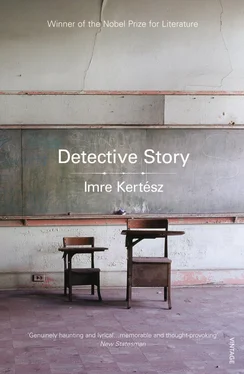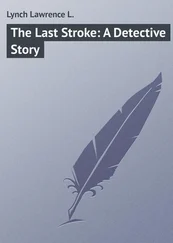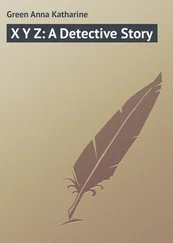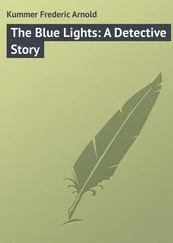“And,” I shouted, “in order to do more than just hate but bare my teeth as well, it’s enough for me to think of myself dutifully taking my exams, starting a family and siring children, paying my taxes and tending flowers in my garden … In short, over time becoming a happy and well-balanced jailbird!”
I stopped talking and looked up into Father’s smoldering eyes. Overcome by an odd feeling, I faltered. It was as though those mute eyes were looking right through me, as though they knew something that I didn’t. Again I sensed his strength, and felt that I was a child.
I was disconcerted. “You can’t understand,” I said.
“Why do you suppose that?” he asked deliberately and gravely.
“Because … because …” I tried but couldn’t find the right word. As if he had me in his power merely because his gravity, his strength, and his gaze towered over me.
“Do you think I’m a coward? A cynic? Stupid?” he asked.
“No, of course not. None of those things,” I said. And all at once I found my own voice again. “It’s just that you can’t step over your own shadow.”
“You think I’m middle class, a bourgeois. A property owner and stock market speculator. Right?”
I don’t know if I did think that; I don’t know if I could think that. When it comes down to it, that is what I am as well. I am privileged because he’s my father. All the same, I said:
“Yes. And I can’t come to terms with your patience.”
“Why?” he asked.
I thought I was going to fall off the chair. He was as inexorable as an examining magistrate. Was I to start all over from the beginning?
“Because,” I exclaimed, “I no longer have patience for even half an hour!” I jumped to my feet. “Don’t you understand that I can’t bear to go on living like this? I’m sick of doing nothing, of my situation, of mediocrity!” A good word that; I was pleased with it. “Yes, that’s it: sick of mediocrity,” I repeated. “Mediocrity is a sickness. Yes, Dad,” I added. “Mediocrity is downright pathological!”
And I rushed off toward the study door. I felt that I had said all I had to say and that I should not allow myself to listen to any more of his arguments. And I felt that I had to escape from the force of his gravity and his gaze in order to be alone and truly able to stand up to him at last …
My hand was on the door handle when his voice arrested me.
“Stop, Enrique! Come back! Take your seat!” he commanded. And I obeyed him, as if … yes, as if I were just waiting for something more, I don’t know what, but something more plausible — some deliverance from this nightmare.
I should note — though I don’t know why I consider it to be of any importance — that Dad was not sitting but standing behind his desk, leaning with his hands on the desktop. Not on the palms of his hands, to be precise, but on his ten splayed-out fingers, inclined slightly forward.
“I heard you out,” he said. “You, however, have not heard me out.” He paused. “I’ll make you a proposal,” he eventually continued. “Consider it. My proposal is that we work together, Enrique. Take part in the work of the sort of men to whom I belong.”
I don’t remember what he said. I mumbled something. All that I noted exactly was his response:
“Yes, Enrique, of course. Only I didn’t know how seriously I could take you. But on the basis of what has been said, I conclude that I can count on you.”
Thereupon he produced a bottle and two glasses from his cocktail cabinet. We clinked glasses. Then we chatted, very seriously for a long time before going across into the dining room. Mother was already seated in her place, dishing out the supper. I ate well, with a hearty appetite.
I am closing Enrique’s diary: I have no further need of it. The rest was our business — Diaz’s, Rodriguez’s, and mine, the new boy’s. Oh, and a matter of the logic that led us to Enrique and Enrique to us.
That logic was not without its flaws. Who said it was? It was initially more just an idea; only later did it become logical. At that point, for instance, we were not aware of Enrique’s diary. How would we have been? It came into our hands only in the course of the house search. And even then none of us read right through it: we didn’t need to, and above all, we didn’t have the time. Things were getting distinctly uncomfortable for us around that time, with incidents coming thick and fast. The Colonel was nervous. We had got wind of an impending atrocity. We had to prevent it, or at least try, with every means at our disposal: Homeland and Colonel demanded that of us. The shaggy-haired weirdos all went into hiding. We circulated their details nationally but with about as much success as if we had been searching, let’s say, for half a dozen irregularly yellow-striped Colorado beetles in a twenty-five-thousand-acre field of potatoes.
We had to go with what was on hand, in other words. And Enrique happened to be on hand. We identified him in a photo among the people who were not on hand. How had he found his way into the photograph? Was he one of them? If he was, why hadn’t he gone into hiding as well? Might he have been left as bait? Or did he have an assignment out in the open? In which case, how could they have let him find his way into a photograph? Or did he have nothing to do with them and appeared in it only by chance?
Questions and yet more questions. We had no time to fiddle around with questions. A huge mechanized apparatus, with records, informers, and all those flatfeet, was looking for something to do: we were set up for organizing, for taking action, not for solving crossword puzzles. We did the broad-brush stuff, not the finicky detailed work. Enrique’s name came up in a search of the records: there was a squeal on him from Ramón. Then that offense on the highway. And now the photo. All of these bits had been there previously, properly filed: we hadn’t taken a look at him. Now, though, we wheeled him in because we needed him, and that altered the complexion of things. Everything is a matter of logic. Events per se mean nothing. Life itself can be regarded as an accident. The function of the police, however, is to bring logic to bear on Creation, as I heard Diaz say many a time. A wise man, Diaz was. I personally did not have much liking for him; he caused me a lot of headaches. But never in my life did I see a flatfoot to beat Diaz. No getting round it. He was born for the work — it was his vocation. Above all, he knew what he wanted, and in our line of work that’s a big deal.
In short, as I say, we were groping around in the dark, metaphorically as well as literally. We sat in a darkroom and had photographs developed and then enlarged. The individuals who were visible in the enlarged shots were then identified, one by one. As I said, we had shot ten dozen rolls of film of them at the Blue Coast and wherever else.
Well anyway, in one of the Blue Coast photos we spotted a new face. He is standing there in the group of wanted individuals. They are laughing, while he seems rather sullen. Ramón immediately identified him as Enrique Salinas. We could have identified him without Ramón’s help, but what’s an informer for if not to make himself useful?
From that moment on Enrique Salinas did not take a step without our knowing about it.
One week later we received a film reel from our people. An interesting movie it was, a worthy reward for our troubles.
Enrique can be seen in it. He enters a café. He is carrying a briefcase. He takes a seat at a table.
Cut.
A chap arrives at the café. A nondescript character, middle-aged, medium height, no distinguishing marks. He is carrying a briefcase. After a brief hesitation, he recognizes Enrique and sits down at his table. They are discussing something, hastily spreading out documents from their briefcases.
Читать дальше












